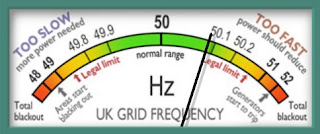 |
| From Regen SW Graphic of the month |
The good news? - Peak UK demand is falling - thanks mainly to more efficient appliances, as well as the observance of triads by - in the main - large industrial users.
The bad news? - At home we largely ignore the stress on the system at peak times, and merrily carry on dishwashing and doing laundry at peak times - stop it!

